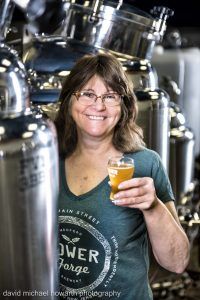 Close your eyes and imagine someone drinking beer. Add in a brewmaster. Chances are, you saw two guys looking kind of manly, maybe even wearing a flannel shirt with rolled-up sleeves. But open your eyes and raise a glass, ’cause times – and breweries – they are changing.
Close your eyes and imagine someone drinking beer. Add in a brewmaster. Chances are, you saw two guys looking kind of manly, maybe even wearing a flannel shirt with rolled-up sleeves. But open your eyes and raise a glass, ’cause times – and breweries – they are changing.
“Some people joke with me that I don’t have facial hair, and all brewers are required to have facial hair,” says Pola Galie, co-owner and assistant brewer at Lower Forge Brewery in Medford, “and I’ll go, ‘Well, that’s not going to happen.’”
Galie joins a growing number of women entering the beer brewing industry – about 29 percent of all U.S. brewery workers are women, although only 4 percent of them hold positions like head brewer or brew master. New Jersey is currently home to 98 craft breweries, and Galie is working with other women in the state to change the notion of what a brewer looks like.
“If you look at the history of beer over time, women have a much stronger role then men do,” says Galie. (In colonial times, women were often the main household brewers.) “So it’s actually like history is repeating itself.”
For Galie, this second career was never part of her life plan, especially considering she was in her 60s when she started and – the biggest surprise of all – she was never a big beer drinker.
“But now I enjoy every part of the process, from developing the recipes to brewing,” says Galie.
“Commercial brewing is easier for me than home brewing – it takes the same amount of time, only I get 95 more gallons of beer, and I don’t have to carry a five-gallon pot of boiling water.”
Galie got involved with brewing when her son, Sean, who works as a full-time firefighter, decided to make the leap from home brewer to commercial brewer. It wasn’t an easy start, so Galie stepped in to help.
“I said, ‘How can I help?’ He looked at me kind of funny and said, ‘You? Brew beer? Let me think about it,” she says.
Sean eventually decided to show her the ropes, and Galie – who also enjoys hobbies like beekeeping and basket weaving – says she was quickly hooked.
“Throughout most of my son’s life I was a single mom, so I played both roles: father and mother. After he turned 21, if there was something we had to talk about, we did it over food, something to drink and a cigar.” The mother and son have owned Lower Forge for two years.
Some organizations are working to improve the number of women in brewing, like the Pink Boots Society, which offers scholarships for education and hosts events for women in the industry. Galie says she is an active member of Pink Boots, and she also educates both men and women about the long history of beer by giving talks to various groups. The efforts seem to be working: In 2008, there were 22 members of the Pink Boots Society, and today there are more than 1,000.
Those growing ranks include Pitman’s Megan Myers, who juggles running her brewing business with raising her two sons. Even though she spends nearly every day brewing beer with her partner Richard at the brewery they co-own, The Human Village Brewing Co., she’s also at the bus stop, both in the morning and afternoon – every day. Plus, she cooks (and eats) dinner with her kids – every day.
“With the brewery I can have that work-life balance, where I can be there to get the kids on and off the bus,” says Myers. “After school, they come hang out at the brewery with me, and we have quality time together while I’m doing some of the prep work that needs to be finished.”
Though being a brewery owner can give women like Myers the ability to create a flexible, family-friendly schedule, the industry can be tough to break into, says Jamie Queli, a fellow brewery owner who is also the president of the New Jersey Brewers Association and the only woman on the association’s executive board.
When Queli opened her brewery, Forgotten Boardwalk, in Cherry Hill a few years ago, she was one of the youngest female brewery owners in the country.
“Getting into this industry is one of the toughest things I’ve ever done. But it’s tough for everyone. It’s the second-most regulated industry in the country, next to pharmaceuticals. There’s a lot of laws, and a lot of state and federal regulations, so it’s a very tough industry to break into. It’s a lot of fun,” she says, “but there’s also a lot of challenges.”
Despite those challenges, Myers says she’s been inspired by a number of New Jersey women brewers who are doing “awesome things” with beer – and encouraging other women to do the same.
“I’ve always worked in male-dominated industries, but craft beer by far has been the most supportive and egalitarian,” she says. “But the women, in particular, have a camaraderie that’s pretty much unparalleled. The way we help each other, give advice – anything you need, you could tap someone else from the industry on the shoulder, and they’d be more than happy to help.”













